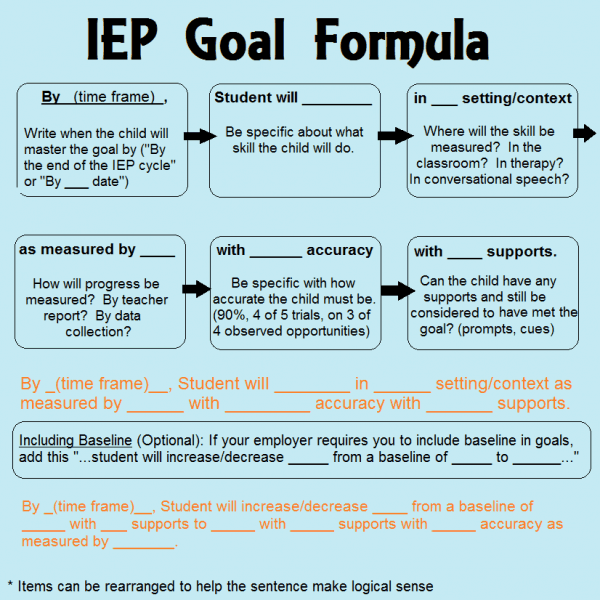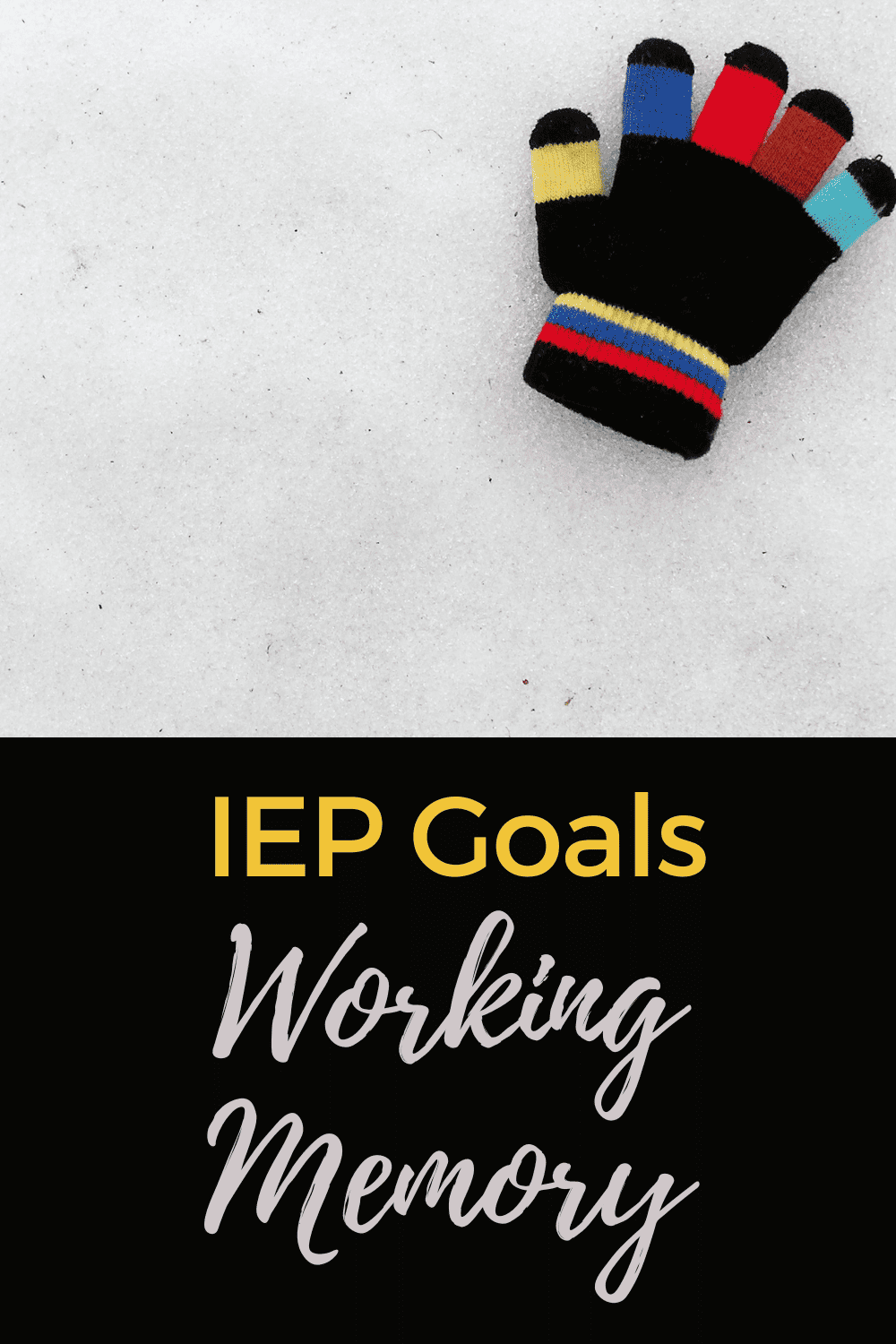15 IEP Goals for Working Memory (and Auditory Memory)
Does your child struggle with Working Memory issues, and do you want them added to the IEP? Have you heard parents talk about working memory skills, but you’re not sure what they are?
Working memory is an essential executive functioning skill. Let’s get something straight right out of the gate: working memory is NOT the same as short-term memory. Think of short-term memory like a sticky note—quick and temporary.

Working memory? It’s like your kid’s brain trying to use the info on that sticky note while solving a math problem, reading a paragraph, or figuring out how to complete a multi-step task. If that sticky note gets lost, crumpled, or overwhelmed, things fall apart fast.
I recently had an SLP (speech-language pathologist) to interview her about working memory and executive functioning. I highly recommend you watch this, whether you’re a parent or a teacher.
If you don’t have time right now, bookmark it or pin it to come back and watch it later.
I have a separate list of working memory accommodations.
Working Memory Limitations
When working memory is weak, a child may:
- Forget instructions midway through carrying them out.
- Struggle with multi-step math problems or reading comprehension.
- Lose track of tasks, like where they left off in writing or building something.
- Appear inattentive or “spaced out” because they can’t hold all the information in mind at once.
Lack of a strong working memory can often be mistaken for cognitive and academic deficits, so interventions are warranted. Working memory involves the ability to keep information active in your mind for a short time to be able to use it for further processing.
Working memory is our temporary storage system and helps us with our day-to-day tasks (e.g. following instructions, responding in conversations, listening and reading comprehension, organization). Can your child follow directions that are 2-3 steps? If not, they may lack working memory skills.
Again, this is one of those invisible skills, or at least it is invisible if it’s present. If a person lacks good working memory skills, then it’s very visible and often treated punitively rather than being supported. Cog-Med has some excellent charts and graphics that show working memory skills. Take a look.
Working Memory Skills for Kids
Choose the skill that your child is lacking, or what they are exhibiting that may be due to a lack of a skill set. Then, plug that skill into the IEP goal formula.

Working Memory Skills-Adult Examples
Here are some adult examples of working memory skills.

Working Memory IEP Goals
Goals should be developed using the student’s baselines defined in IEP Present Levels.
From there, I would take the area of need and using the baseline and the IEP goal formula, make it measurable (flow chart below).
- The student will accurately repeat verbal instructions with 80% accuracy before beginning assignment as evidenced by teacher/staff observation and data.
- The student will accurately follow classroom procedures for turning in assignments with 80% accuracy 4 out of 5 consecutive days.
- The student will use mnemonics to aid in memorization of content material 4 out of 5 times as measured by teacher observations and data.
- The student will use graphic organizers to record or recall content knowledge 8 out of 10 times as evidenced by teacher feedback.
- The student will use an app or designated system to record questions that cannot be answered immediately.

Working Memory IEP Goals
- The student will demonstrate improved working memory by recalling and accurately repeating a sequence of 10 unrelated words after a single presentation with 80% accuracy.
- The student will exhibit enhanced working memory by completing multi-step math problems with 90% accuracy.
- The student will display improved working memory by recalling and following a series of 5-7 step instructions with 85% accuracy.
- The student will demonstrate increased working memory by recalling and accurately writing down a series of 8-10 unrelated numbers after a single presentation with 75% accuracy.
- The student will exhibit enhanced working memory by recalling and accurately reproducing a sequence of 10 unrelated objects after a single presentation with 80% accuracy.
- The student will display improved working memory by recalling and following a series of 3-5 step directions with 90% accuracy.
- The student will demonstrate increased working memory by recalling and accurately writing down a series of 6-8 unrelated letters after a single presentation with 80% accuracy.
- The student will exhibit enhanced working memory by recalling and accurately reproducing a sequence of 15 unrelated syllables after a single presentation with 75% accuracy.
- The student will display improved working memory by recalling and following a series of 5-7 step procedures with 85% accuracy.
- The student will demonstrate increased working memory by recalling and accurately writing down a series of 10-12 unrelated words after a single presentation with 70% accuracy.
IEP Goals for Auditory Memory
- The student will demonstrate improved auditory memory by recalling and accurately repeating a sequence of 6-8 spoken words after a single presentation with 85% accuracy.
- The student will exhibit enhanced auditory memory by recalling and accurately following a series of 3-5 spoken instructions with 90% accuracy.
- The student will display improved auditory memory by recalling and accurately repeating a series of 8-10 spoken numbers after a single presentation with 80% accuracy.
- The student will demonstrate increased auditory memory by recalling and accurately repeating a sequence of 10 unrelated spoken syllables after a single presentation with 75% accuracy.
- The student will exhibit enhanced auditory memory by recalling and accurately repeating a series of 4-6 spoken sentences with 85% accuracy.
But wait, there’s more! Working memory is an essential executive functioning skill, and if you want success, there’s more to know.
Auditory Memory
Auditory memory refers to the ability to store and recall information that has been heard or processed through the auditory system. It is a component of sensory memory, which is a short-term form of memory that temporarily holds sensory information from the environment. Auditory memory involves the retention and recall of sounds, spoken words, music, and other auditory stimuli.
There are different aspects of auditory memory:
- Short-term auditory memory: This type of memory involves the temporary storage of auditory information for a brief period, typically lasting a few seconds to a minute. For example, when you listen to a phone number and repeat it to yourself before dialing, you are using short-term auditory memory.
- Long-term auditory memory: Long-term auditory memory involves the storage and retrieval of auditory information over a more extended period, potentially lasting for years. This can include remembering melodies, songs, or spoken phrases from the distant past.
- Auditory working memory: Working memory is a system that temporarily holds and manipulates information while performing cognitive tasks. Auditory working memory comes into play when you need to remember and process auditory information simultaneously, such as following spoken instructions or solving problems based on verbal information.
Auditory memory plays a crucial role in various aspects of our daily lives, including language comprehension, learning, communication, and music appreciation. It is closely related to cognitive processes like attention, perception, and comprehension, as it enables individuals to make sense of the sounds and spoken language in their environment.
Impairments in auditory memory can impact a person’s ability to understand and remember spoken information, which can have significant consequences in academic, professional, and social contexts.
Auditory Memory vs Working Memory
Working memory and auditory memory are related but not the same thing.
They are distinct cognitive functions, but working memory can involve the manipulation and temporary storage of auditory information.
Working Memory:
- Working memory is a system that allows you to temporarily hold and manipulate information needed to perform cognitive tasks. It is like a mental workspace where you can process, rearrange, and work with information in real-time.
- Working memory encompasses information from various sensory modalities, including visual, auditory, and spatial information. It is not limited to just auditory information.
- Working memory involves executive functions like attention, decision-making, problem-solving, and planning.
- It is an active cognitive process that helps individuals manage multiple tasks and process information efficiently.
Auditory Memory:
- Auditory memory specifically refers to the ability to store and recall information that has been heard or processed through the auditory system. It is a subset of working memory that deals with auditory information.
- Auditory memory primarily focuses on the retention and recall of sounds, spoken words, music, and other auditory stimuli.
- While working memory can involve auditory information, it also includes other types of information, such as visual or spatial data.
- Auditory memory is essential for tasks like remembering and following spoken instructions or recalling information from a conversation.
In summary, working memory is a broader concept that encompasses various types of information and is involved in cognitive processes beyond memory, while auditory memory is specific to the retention and recall of auditory information.
However, working memory can include auditory memory as one of its components when dealing with auditory tasks or processing spoken information.
Working Memory Skills-Fluctuations
Many students lack working memory skills, or our skills fluctuate depending on age and stage of life. When we are stressed, we forget things. When we’re sick, unhealthy, distracted, the importance of the item…all of these things can affect working memory.
I can remember exactly what brands and varieties of foods Kevin will eat and which restaurants have items for him.
But I cannot buy my husband a 6-pack of beer that he likes and I continually buy him the wrong packs of sushi at Wegman’s. One item is just more important for me to remember.
If you’re aware of your issues, most adults compensate and find their own accommodations, such as creating a shopping list before you go to the grocery store.
But if you have other learning disabilities or problem-solving is not your strong suit, the student may need accommodations and practice. Your working memory can improve with practice.
Working Memory IEP Goals
Here is a great chart I found from LD Canada.
https://adayinourshoes.com/wp-content/uploads/Working-Memory-IEP-Goals.pdf
In addition to IEP goals and SDIs that address working memory, you want it to be fun. There are many categories of board games and puzzles that will exercise your working memory.
A final note: I have seen so many kids who are punished for forgetting homework. Punished for forgetting to bring something to school or home. Yes, to function in society, it’s important to learn working memory skills or have our own set of supports.
I cannot stress enough to work with the child, get their input and ideas and suggestions. I have seen too many kids just get downtrodden and deflated, because they are punished or grounded, over and over for something they are having trouble learning.
Most kids want to improve these skills and are not just being defiant by not bringing in homework.
Stick with your child and get your team on board with supports and activities that help your child learn these skills….not just continually being punished for not having them.
Good luck!
- Emotional Self-Regulation IEP Goals
- Study Skills IEP Goals
- Focus and Attention IEP Goals
- Inference IEP Goals
- Working Memory IEP Goals
- Task Initiation IEP Goals
- Impulse Control IEP Goals
- Work Completion IEP Goals
- Executive Functioning IEP Goals
- Free IEP Goal Bank with 1000+ Measurable IEP Goals and Objectives separated by Domain


